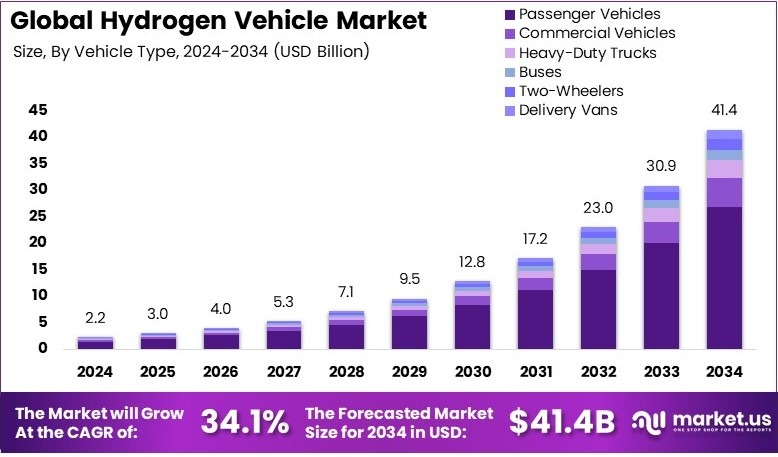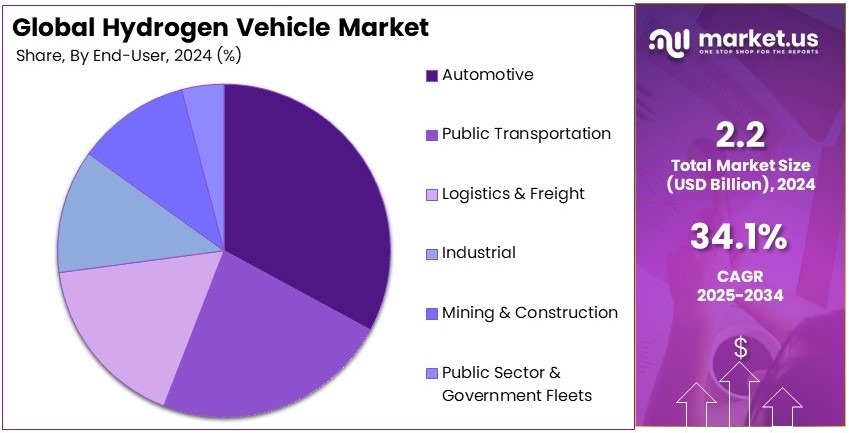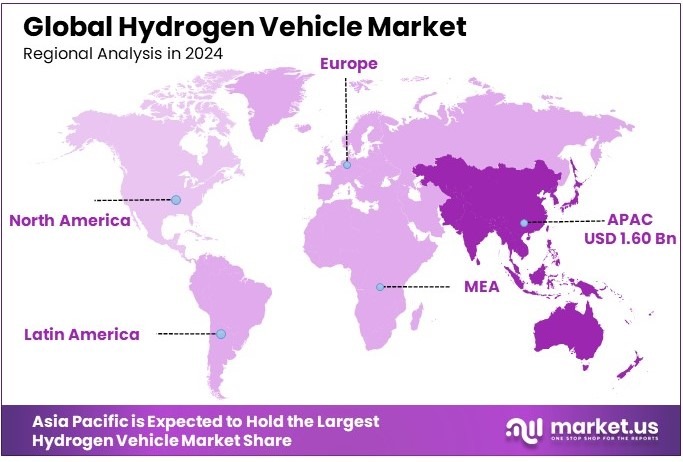Global Hydrogen Vehicle Market Size, Share, Growth Analysis By Vehicle Type (Passenger Vehicles, Commercial Vehicles, Heavy-Duty Trucks, Buses, Two-Wheelers, Delivery Vans), By End-User Industry (Automotive, Public Transportation, Logistics & Freight, Industrial, Mining & Construction, Public Sector & Government Fleets), By Vehicle Technology (Proton Exchange Membrane Fuel Cells, Solid Oxide Fuel Cells, Alkaline Fuel Cells, Direct Methanol Fuel Cells), By Region and Companies - Industry Segment Outlook, Market Assessment, Competition Scenario, Statistics, Trends and Forecast 2025-2034
- Published date: Jan 2025
- Report ID: 138212
- Number of Pages: 199
- Format:
-
keyboard_arrow_up
Quick Navigation
Report Overview
The Global Hydrogen Vehicle Market size is expected to be worth around USD 41.4 Billion by 2034, from USD 2.2 Billion in 2024, growing at a CAGR of 34.1% during the forecast period from 2025 to 2034.
A Hydrogen Vehicle is a type of vehicle powered by hydrogen fuel, instead of traditional gasoline or electricity. These vehicles use hydrogen to generate electricity through a fuel cell, producing water vapor as the only emission. They are considered an eco-friendly alternative to conventional fuel-powered vehicles.
The Hydrogen Vehicle Market refers to the demand and sales of vehicles powered by hydrogen fuel cells. It includes market trends, major manufacturers, technological developments, and consumer adoption of hydrogen-powered vehicles. This market focuses on the transition to cleaner, sustainable transportation solutions.

Hydrogen vehicles are gaining attention due to their higher efficiency compared to conventional cars. While gasoline engines typically use less than 20% of energy, hydrogen fuel cell vehicles can use 40-60%. This significant improvement in energy efficiency positions hydrogen vehicles as a strong alternative for reducing emissions in the transportation sector.
The hydrogen vehicle market is growing, driven by the increasing focus on clean energy. Governments are supporting this shift with incentives and regulations. The European Union, for example, is promoting renewable hydrogen as part of its Green Deal. This will help reduce reliance on fossil fuels and lower greenhouse gas emissions by 70%.
Several factors are driving the demand for hydrogen vehicles. Rising concerns about climate change and the push for energy efficiency are key growth factors. Additionally, the automotive sector is focusing on cleaner alternatives to traditional vehicles. The European Union’s hydrogen strategy aims to boost hydrogen use and lower carbon emissions by 2050.
While the hydrogen vehicle market is expanding, it faces challenges such as high production costs and infrastructure limitations. Competitively, many players are entering the market, but it’s still in early stages. Technological advancements and scaling production will be necessary for market growth. Therefore, it’s important to monitor future developments closely.
Government investment is a crucial factor in the market’s development. Policies like the EU’s hydrogen strategy and the RepowerEU plan promote the growth of renewable hydrogen production. These regulations are pushing manufacturers to adopt hydrogen fuel cells and make transportation cleaner and more sustainable in the long run.
Key Takeaways
- The Hydrogen Vehicle Market was valued at USD 2.2 billion in 2024 and is expected to reach USD 41.4 billion by 2034, with a CAGR of 34.1%.
- In 2024, Passenger Vehicles dominate the vehicle type segment with 64.9%, reflecting strong consumer demand for clean, efficient transportation.
- In 2024, Automotive Industry leads the end-user industry segment, fueled by the industry’s push toward zero-emission vehicles (ZEVs).
- In 2024, Proton Exchange Membrane Fuel Cells (PEMFC) dominate the vehicle technology segment, driven by their high efficiency and suitability for automotive applications.
- In 2024, Asia Pacific holds a dominant share of 72.6%, valued at USD 1.60 billion, benefiting from high adoption rates and supportive government policies.
Vehicle Type Analysis
Passenger Vehicles dominate with 64.9% due to their widespread use and growing adoption of hydrogen fuel technology.
In the Hydrogen Vehicle Market, passenger vehicles are the dominant segment, accounting for 64.9% of the market share. This dominance is driven by the increasing consumer demand for clean and efficient alternatives to traditional gasoline-powered cars.
Hydrogen-powered passenger vehicles offer longer ranges, faster refueling times, and zero emissions, making them an attractive option for environmentally conscious consumers. Many automakers are investing heavily in hydrogen fuel cell technology, and several models, such as the Toyota Mirai and Hyundai Nexo, have already been introduced to the market, helping to popularize hydrogen vehicles.
Commercial vehicles, including buses, delivery vans, and heavy-duty trucks, follow in importance but have a smaller share in comparison. Hydrogen vehicles in these segments are gaining traction due to their potential to reduce operating costs and their ability to handle long-distance travel.
Two-wheelers and specialized commercial vehicles, like mining and construction equipment, represent niche markets. These vehicles are still in early stages of development and adoption. However, their role is significant as they offer potential for decarbonization in specific sectors that have historically been reliant on fossil fuels.
End-User Industry Analysis
Automotive industry dominates with a significant share due to the increasing shift towards hydrogen-powered passenger vehicles.
The automotive industry holds the largest share in the hydrogen vehicle market. The rise in consumer awareness about environmental concerns and the growing demand for clean, renewable energy sources drive this shift.
Major automotive players are developing hydrogen-powered vehicles to meet regulatory standards for emissions reduction and to cater to the growing eco-conscious market. Hydrogen-powered passenger vehicles, like the Toyota Mirai and Hyundai Nexo, are examples of how the automotive industry is leading this transition.
Public transportation is another key end-user industry for hydrogen vehicles, especially buses. Cities worldwide are adopting hydrogen-powered buses to reduce air pollution and meet environmental goals. The logistics and freight industry is also starting to show interest in hydrogen-powered delivery vans and trucks.
Other industries, like mining, construction, and industrial applications (such as forklifts and material handling), also contribute to market growth. These sectors are looking for sustainable solutions to reduce carbon emissions, and hydrogen-powered vehicles are a viable option for specific tasks in these industries.

Vehicle Technology Analysis
Proton Exchange Membrane Fuel Cells (PEMFC) dominate with a significant share due to their efficiency, compactness, and high performance.
Proton Exchange Membrane Fuel Cells (PEMFC) dominate the hydrogen vehicle technology segment. This technology is widely used in hydrogen-powered vehicles due to its high efficiency, lightweight nature, and ability to operate at relatively low temperatures.
PEMFCs are particularly well-suited for automotive applications because they offer fast start-up times, high energy density, and are relatively compact, making them ideal for use in passenger vehicles. This technology is essential for providing the necessary power for long-distance travel while maintaining quick refueling times, which are important for commercial and passenger vehicle applications.
Solid Oxide Fuel Cells (SOFC) follow in importance. While SOFCs offer higher efficiency and are better suited for stationary applications, their high operating temperature and slow start-up times make them less suitable for vehicle use. These cells are still being explored for larger-scale applications, such as in commercial vehicles or industrial machinery, where their advantages can be fully utilized.
Alkaline Fuel Cells (AFC) and Direct Methanol Fuel Cells (DMFC) are also part of the market but have limited applications. AFCs are known for their high efficiency, but they are more sensitive to carbon dioxide, which limits their use in vehicles. DMFCs are being explored for niche applications, such as in portable or small-scale power generation, but are not yet widely used in hydrogen-powered vehicles.
Key Market Segments
By Vehicle Type
- Passenger Vehicles
- Commercial Vehicles
- Heavy-Duty Trucks
- Buses
- Two-Wheelers
- Delivery Vans
By End-User Industry
- Automotive
- Public Transportation
- Logistics & Freight
- Industrial (e.g., forklifts, material handling)
- Mining & Construction
- Public Sector & Government Fleets
By Vehicle Technology
- Proton Exchange Membrane Fuel Cells (PEMFC)
- Solid Oxide Fuel Cells (SOFC)
- Alkaline Fuel Cells (AFC)
- Direct Methanol Fuel Cells (DMFC)
Driving Factors
Rising Demand for Sustainable and Eco-friendly Transportation Solutions Drives Market Growth
The Hydrogen Vehicle Market is witnessing strong growth due to the rising demand for sustainable and eco-friendly transportation solutions. As concerns over air pollution and climate change intensify, consumers and businesses are looking for alternatives to traditional gasoline and diesel-powered vehicles.
Hydrogen fuel cell vehicles (FCVs) offer a zero-emissions solution that significantly reduces greenhouse gases, making them an attractive choice for eco-conscious consumers and companies aiming to meet sustainability goals.
Moreover, hydrogen-powered vehicles are particularly appealing in sectors like public transportation, logistics, and heavy-duty transport, where long driving ranges and quick refueling times are critical. The shift toward cleaner, greener transportation options is being driven by a combination of environmental awareness, the need for energy diversification, and government initiatives to reduce carbon emissions.
The growing focus on decarbonization in the automotive and transportation sectors is one of the key factors that is propelling the expansion of the hydrogen vehicle market, as hydrogen fuel presents a viable alternative to traditional fuels, thereby contributing to the market’s upward trajectory.
Restraining Factors
Limited Availability of Hydrogen Refueling Stations Restraints Market Growth
Despite the promising outlook for hydrogen vehicles, challenges remain that may limit the market’s full potential, especially the limited availability of hydrogen refueling stations. A major barrier to widespread adoption is the lack of infrastructure to support hydrogen fuel cell vehicles.
Unlike electric vehicles, which can be charged at home or at numerous charging stations, hydrogen vehicles require specialized refueling stations, which are still relatively sparse, particularly outside of urban areas.
This lack of refueling infrastructure raises concerns among consumers regarding the practicality of owning hydrogen vehicles, especially in regions with few refueling stations. Additionally, setting up hydrogen refueling stations is capital intensive, requiring significant investments in infrastructure development and regulatory approvals.
Without a comprehensive network of stations, hydrogen vehicles cannot be fully integrated into mainstream transportation, preventing the market from achieving rapid adoption. The scarcity of hydrogen refueling stations is one of the key factors holding back the market and continues to limit the growth of the hydrogen vehicle industry.
Growth Opportunities
Integration of Hydrogen Vehicles in Public Transport Systems Provides Opportunities
One of the most promising growth opportunities in the Hydrogen Vehicle Market lies in the integration of hydrogen vehicles into public transport systems. Public transportation represents a significant share of urban emissions, and governments worldwide are looking for ways to reduce their carbon footprint. Hydrogen fuel cell buses, trains, and other public transit vehicles offer an ideal solution.
By transitioning to hydrogen-powered fleets, cities can significantly cut down on air pollution, reduce dependence on fossil fuels, and contribute to achieving sustainability targets. The adoption of hydrogen vehicles in public transport is already gaining momentum in countries like Germany, Japan, and the UK, where hydrogen buses and trains are becoming an increasingly common sight.
Moreover, the use of hydrogen in public transportation systems can help create a reliable demand for hydrogen fuel, driving the expansion of the refueling infrastructure needed to support both private and commercial vehicles.
Emerging Trends
Regional Analysis
Asia Pacific Dominates with 72.6% Market Share
Asia Pacific is the clear leader in the hydrogen vehicle market, commanding a 72.6% share, which translates to USD 1.60 billion. This dominance can be attributed to several key factors, including the region’s strong commitment to clean energy technologies, government support for hydrogen infrastructure, and the presence of major automotive manufacturers in countries like Japan, South Korea, and China.
The region’s government policies are central to this growth. Japan and South Korea have been early adopters of hydrogen technology, with substantial investments in hydrogen infrastructure, including fueling stations and production plants.
China, as a global leader in electric vehicles, has also started investing heavily in hydrogen as a complementary clean energy solution, further driving the growth of hydrogen-powered vehicles in the region. Additionally, the region’s heavy reliance on industrial sectors such as manufacturing, transportation, and logistics contributes to the demand for hydrogen vehicles as a cleaner alternative to fossil fuel-powered trucks and buses.

Regional Mentions:
- North America: North America, particularly the U.S., is focusing on hydrogen technology for both vehicles and industrial uses. Several large automakers are investing in hydrogen fuel cells, which will help the region expand its hydrogen vehicle market share.
- Europe: Europe is embracing hydrogen vehicles as part of its broader strategy to reduce carbon emissions. The EU has rolled out initiatives to boost hydrogen infrastructure, contributing to the market’s growth in countries like Germany and France.
- Middle East & Africa: The Middle East and Africa are slowly entering the hydrogen vehicle market, with a focus on utilizing hydrogen for both energy and transportation solutions. Countries like Saudi Arabia are investing in hydrogen technology for future mobility.
- Latin America: Latin America is beginning to explore hydrogen vehicles, though it remains in the early stages. Governments and businesses in countries like Brazil are looking into hydrogen-powered transport as part of sustainable energy projects.
Key Regions and Countries Covered in the Report
- North America
- US
- Canada
- Europe
- Germany
- France
- The UK
- Spain
- Italy
- Rest of Europe
- Asia Pacific
- China
- Japan
- South Korea
- India
- Australia
- Rest of APAC
- Latin America
- Brazil
- Mexico
- Rest of Latin America
- Middle East & Africa
- South Africa
- Saudi Arabia
- UAE
- Rest of MEA
Competitive Landscape
The Hydrogen Vehicle Market is rapidly growing, with key players driving innovation and shaping the industry’s future. Among the top companies, Toyota Motor Corporation, Honda Motor Co., Ltd., Hyundai Motor Company, and BMW Group are leading the charge in hydrogen vehicle development and commercialization.
Toyota Motor Corporation is a pioneer in hydrogen fuel cell vehicles (FCVs), with its well-known model, the Toyota Mirai, being one of the first commercially available hydrogen-powered cars. Toyota’s continued investment in hydrogen infrastructure and vehicle technology has solidified its position as a market leader. The company is also focused on reducing hydrogen production costs, which is key to expanding the market.
Honda Motor Co., Ltd. has been a significant player in the hydrogen vehicle market, with its Clarity Fuel Cell model showcasing the company’s commitment to eco-friendly technologies. Honda collaborates with various organizations to develop and improve hydrogen infrastructure, aiming to make hydrogen-powered vehicles more accessible to the public. Their ongoing R&D efforts are pushing the boundaries of fuel cell technology.
Hyundai Motor Company is also at the forefront of the hydrogen vehicle market, with the Hyundai NEXO being a notable example of their fuel cell technology. The company has invested heavily in hydrogen infrastructure, partnerships with energy providers, and government collaborations to drive the adoption of hydrogen vehicles, particularly in markets like South Korea and Europe.
BMW Group has been actively working on hydrogen-powered vehicles, focusing on its BMW i Hydrogen NEXT model. BMW is committed to sustainable mobility and sees hydrogen as a crucial element in the transition to clean transport. Their extensive experience in automotive engineering and strong brand presence gives them an edge in competing within this emerging market.
These top players are not only developing vehicles but also helping create the necessary infrastructure for the widespread adoption of hydrogen technology, positioning themselves as key drivers of the future hydrogen vehicle market.
Major Companies in the Market
- Toyota Motor Corporation
- Honda Motor Co., Ltd.
- Hyundai Motor Company
- BMW Group
- General Motors (GM)
- Nikola Corporation
- Rivian Automotive, Inc.
- Ballard Power Systems
- PowerCell Sweden AB
- FuelCell Energy, Inc.
- Cummins Inc.
- Volvo Group
- Mercedes-Benz Group AG
Recent Developments
- Hyundai: On October 2024, Hyundai unveiled its INITIUM hydrogen fuel cell electric vehicle (FCEV) concept, showcasing its new design language, “Art of Steel.” The concept previews a new production FCEV set to launch in the first half of 2025, offering over 650 km of driving range, 150 kW motor output, and advanced features like a Vehicle-to-Load (V2L) function for powering household devices.
- BMW: On September 2024, BMW announced plans to launch its first series-production hydrogen vehicle in 2028, developed in collaboration with Toyota. The vehicle, which is part of a joint R&D effort between the two companies, will feature a hydrogen-powered powertrain, marking a milestone in automotive history and signaling the start of a new era for fuel cell electric vehicles (FCEVs).
Report Scope
Report Features Description Market Value (2024) USD 2.2 Billion Forecast Revenue (2034) USD 41.4 Billion CAGR (2025-2034) 34.1% Base Year for Estimation 2024 Historic Period 2020-2023 Forecast Period 2025-2034 Report Coverage Revenue Forecast, Market Dynamics, Competitive Landscape, Recent Developments Segments Covered By Vehicle Type (Passenger Vehicles, Commercial Vehicles, Heavy-Duty Trucks, Buses, Two-Wheelers, Delivery Vans), By End-User Industry (Automotive, Public Transportation, Logistics & Freight, Industrial, Mining & Construction, Public Sector & Government Fleets), By Vehicle Technology (Proton Exchange Membrane Fuel Cells, Solid Oxide Fuel Cells, Alkaline Fuel Cells, Direct Methanol Fuel Cells) Regional Analysis North America – US, Canada; Europe – Germany, France, The UK, Spain, Italy, Rest of Europe; Asia Pacific – China, Japan, South Korea, India, Australia, Singapore, Rest of APAC; Latin America – Brazil, Mexico, Rest of Latin America; Middle East & Africa – South Africa, Saudi Arabia, UAE, Rest of MEA Competitive Landscape Toyota Motor Corporation, Honda Motor Co., Ltd., Hyundai Motor Company, BMW Group, General Motors (GM), Nikola Corporation, Rivian Automotive, Inc., Ballard Power Systems, PowerCell Sweden AB, FuelCell Energy, Inc., Cummins Inc., Volvo Group, Mercedes-Benz Group AG Customization Scope Customization for segments, region/country-level will be provided. Moreover, additional customization can be done based on the requirements. Purchase Options We have three licenses to opt for: Single User License, Multi-User License (Up to 5 Users), Corporate Use License (Unlimited User and Printable PDF) 
-
-
- Toyota Motor Corporation
- Honda Motor Co., Ltd.
- Hyundai Motor Company
- BMW Group
- General Motors (GM)
- Nikola Corporation
- Rivian Automotive, Inc.
- Ballard Power Systems
- PowerCell Sweden AB
- FuelCell Energy, Inc.
- Cummins Inc.
- Volvo Group
- Mercedes-Benz Group AG










